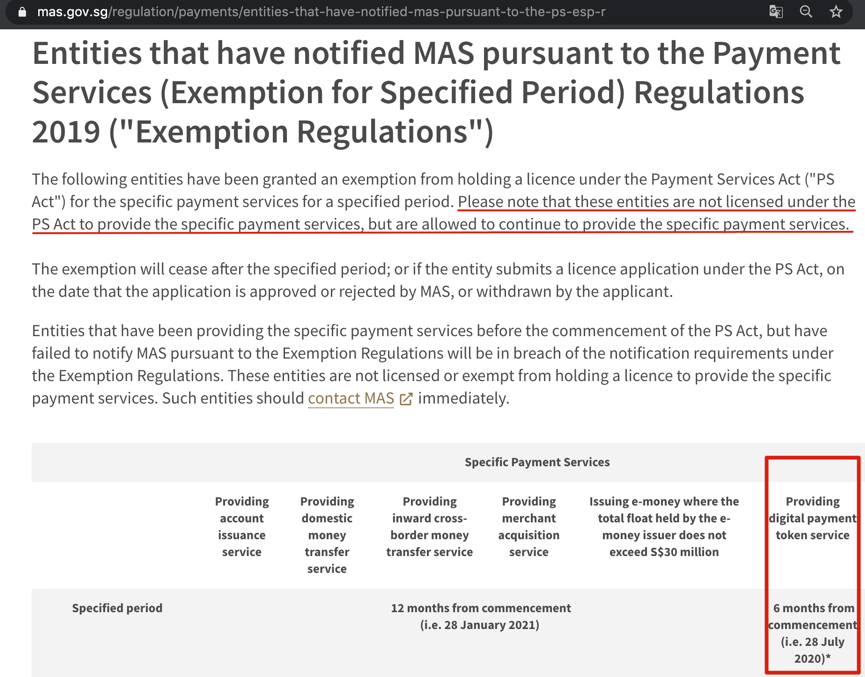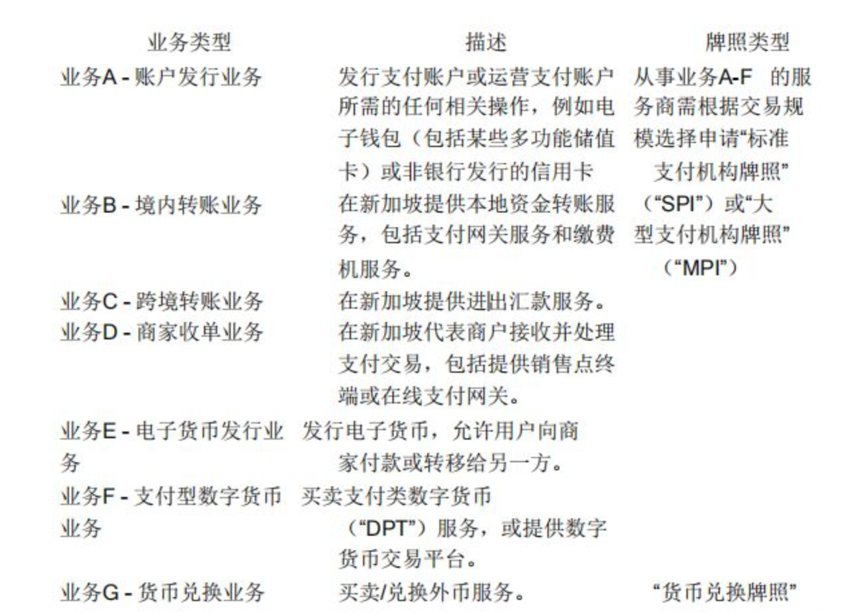Exchange pushes Singapore into compliance
Text: 嚯 嚯
Source: Hive Finance
On March 27, the Singapore Financial Regulatory Authority (MAS) officially announced a list of companies that comply with the Payment Services (Exemption for a Specified Period) Regulations 2019. According to statistics, of the 414 companies on the exempt list, about 194 companies provide "digital token payment services", accounting for 46%. The main entities of Huobi, OK, and Binance's three digital asset trading platforms in Singapore have obtained operating rights within a specified period.
However, exemption does not mean that it is licensed or licensed. The MAS authorities emphasized that the immunity would be valid for a specified period. Currently, the end date for providing digital payment token services is July 28.
- Analysis of 3 smart contract architectures: Bank of England March Digital Fiat Report
- The true face of Zhongqingbao's blockchain: no business logic, the actual controller continues to reduce its holdings
- Economist Lang Xianping talks about the blockchain industry under the epidemic: stripping of currency attributes, blockchain rebirth
Six months after the entry into force of the Singapore Payment Services Act on January 28 this year, companies offering new digital token payment services can apply for two of the three types of licenses. The subject of this batch of regular exemptions is the enterprise applying for a license.
Mr. Zhang, a person engaged in the digital currency custody business on the list, believes that it is unknown whether the companies involved in digital payment token services will eventually be licensed.
In the last two years, compliance is a resource actively sought by many digital asset exchanges. Even in some countries that clearly stipulate that digital currency transactions are prohibited, the three major head platforms of "HBO" all intend to establish their own non-currency-related entities, and make advance arrangements by means of technical services and scientific research.
Seeking compliance is a slow process. One reason is that countries need to think carefully about digital currencies and their regulatory means.
Jeff Liu, co-founder of the blockchain security agency PeckShield, believes that digital assets generated based on data characteristics such as blockchain decentralization and anonymity can be difficult and costly to lock and track on the chain, causing headaches for financial regulators in many countries.
HBO obtains 4-month operation right in new entity
Among the list of companies operating within the acquisition period announced by the Singapore Financial Supervisory Authority (MAS) on March 27, in addition to traditional giants involved in payment services such as Alibaba, Alipay, Amazon, etc., companies in the crypto asset field have entered the exempt list. These include digital asset trading platforms and custodian companies that provide Digital Payment Token services.
The news was introduced into the domestic currency circle from Singapore. The main companies in Singapore that are familiar with the three major trading platforms of OK, Binance, and Huobi in Singapore are listed on the list. They are OKCOIN PTE. LTD and BINANCE ASIA SERVICES PTE. LTD. And FEU INTERNATIONAL PTE. LTD.
A single name emerged, and the news that various exchanges were exempted from operating in the new entity quickly appeared on social networks, triggering industry discussions.
Following the Payment Services Act, which took effect on January 28, the Monetary Authority of Singapore, companies that provide digital token payment services can apply for payment licenses within a specified period. Before July 28, the companies allowed to operate in the new currency circle are also companies that have already submitted applications.
However, it should be noted that the MAS has emphasized that obtaining an exemption does not mean that these entities have obtained a license to operate specific payment services in Singapore. The exemption will be suspended after a specified period.

In Singapore's first batch of exemption lists, in addition to some new entities in the head trading platform, there are also a large number of less well-known trading platform entities, lenders, and token issuers. According to media statistics, of the 414 companies on the exempt list, about 194 companies provide "digital token payment services", accounting for 46%.
After reviewing the “Guidelines for Application for Payment Services Operating Licence” previously published by MAS, it can be seen that the digital currency enterprises that have been granted the exemption are mainly because they have completed the filing of license applications before February 27, 2020. In other words, companies that have filed license applications with the MAS before February 27 will be exempted.
On December 18 last year, MAS published the latest "Payment Service Provider License Application Guide" on its official website and uploaded 4 sample application forms. The "New Guide" clarifies the conditions, requirements and procedures for enterprises to complete the application for payment licenses. The application conditions include local permanent commercial office, basic capital requirements, payment of guarantees, technical risk control, internal audit, etc. After the above conditions are met, the enterprise can complete the application by submitting certification materials as required.
"The threshold for currency companies to obtain exemptions is not high, and it is not necessarily related to the eventual license." An industry source said.
According to the MAS regulations, the exempted business for a period of four months is limited to Singapore. For exempted businesses operating overseas, they must also comply with local regulations. This means that the new entity of the trading platform cannot provide services to consumers in China.
MAS is still exploring the details of digital token payment
The Payment Services Act introduced by Singapore in 2019 has made the country one of the few countries with clear regulation of the digital currency field, which is undoubtedly a good thing for companies engaged in the digital currency industry. At least, from the announcement of the exemption regulations on March 27 to July 28, the exchanges that newly launched digital currency services have obtained a window period for licenses.
In the end who can license, you need to pay attention to the information of MAS after July 28.
After the Payment Services Act entered into force in Singapore this year, companies that provide account issuance, domestic remittances, cross-border remittances, commercial acquisitions, electronic money issuance, digital payment tokens, and currency exchange services will need to apply for payment licenses. Three types of licenses that can be applied for include currency exchange licenses, standard payment agency licenses (SPI) and large payment agency licenses (MPI).
Currency exchange licenses are only applicable to businesses that trade in or exchange foreign currencies, and can only provide legal currency exchange services. Service providers that provide digital currencies are more in line with the application requirements for the latter two types of licenses.

Types of licences MAS can apply for
A digital currency custodian company where Mr. Zhang works is also included in the list of exempt businesses. He introduced that the more complicated part of the bill involves many types of business, and many companies operating digital currency businesses pay more attention to F-type business-Digital Payment Token. But in fact, there is a lot more to clarify in category F. In December of last year, MAS issued a consultation book on the scope of "E-money and Digital Payment Token", and this part is still in the negotiation process. "It can be seen that there are still some details of these two businesses to be clarified."
As far as he knows, many companies want to classify Stable Coin into E-money, "because the bill's definition and quota requirements for electronic money are similar to StableCoin coins." The actual conditions of use may conflict with regulations. For example, each person can only trade 5,000 yuan per day. This limit does not work in the digital currency field. There are also some details in the application scenario, such as whether the use of Stable Coin involves cross-border payments. .
Aiming at the two payment licenses from digital token payment service providers-small SPI licenses and large MPI licenses, Mr. Zhang introduced that many companies he knows want to apply for MPI. What can be satisfied mainly depends on the transaction volume. The company can meet the quota requirements, and the main conditions of the application are relatively easy to meet. Of course, MAS supervises such companies. "
Regarding the expectation of the final application result, Mr. Zhang believes that if all the companies that meet the requirements are licensed, there may be hundreds of companies that can be licensed.
"This way is to allow all companies to fully operate and compete after the full batch of MAS, the supervision will monitor your real business situation, and the one who survives will become the boss of the industry (effectively licensed)."
Another possibility is to limit the number of licenses. For example, there are 300 companies applying for licenses, but only 150 licenses.
"We have also consulted MAS. If this is the case, then everyone is qualified according to the conditions. How do you determine who should not give MAS to them? Their response to us is that this aspect has not been considered well. . "
The facts of this bill in Singapore show progress, but after the exemption period, there are still many uncertain factors in which license plate will eventually be "lost."
Before Singapore, Malta also introduced similar transitional regulations that allow digital currency exchanges to operate in accordance with the temporary provisions of Malta's Virtual Financial Assets Act. The transition period is one year and the deadline is November 2019. . After the expiration of the transition period, the exchange still needs to apply for an operating license from the Malta Financial Services Authority MFSA. But so far, no exchange has been approved.
According to the contents of the Singapore Act, some people in the industry judge that for digital currency exchanges, the application for a license is open, but it is still difficult to say whether it will eventually be licensed.
"Achieving the conditions is one thing. The key depends on whether MAS has adjusted the specific details in the next 4 months."
Exchanges comply with regulations
Compliance has always been an important resource sought by many exchanges, and the head smell and movement of head exchanges are more agile. Even in some countries that have not yet been regulated or explicitly not allowed, head platforms are being deployed in advance.
Binance is currently available in Uganda (supporting Ugandan shillings) and British Jersey (supporting euros and pounds). The former is a relatively backward country, and the financial supervision rules for digital currencies have not been clearly defined. The latter Jersey is a British Royal Territory and its regulations on digital assets are relatively loose.
Eurotech Group and the Malta Stock Exchange jointly launched the security token trading platform OKMSX. In addition, OKCoin, the main company of Eurotech Group in the United States, has obtained a US MSB (Money Service Provider) license, which supports US dollar deposit and withdrawal while also providing digital asset trading services for US users. On March 30, the Eurotech Group announced that its subsidiary OKCoin Japan successfully passed the approval of the Japan Financial Services Agency and became the first platform in the head exchange to apply for a Japanese license.
Huobi Group implements compliance services by setting up sub-stations in Japan, South Korea and other places. Among them, Huobi achieved “curve license” in Japan by acquiring a licensed compliance exchange BitTrade. In addition, Huobi also entered the US market through its partner HBUS, and applied for a DLT license in Gibraltar, Europe, and was approved to launch digital asset trading services in Europe.
It can be seen that in recent years, as digital assets have become mainstream and caused regulatory concerns, many transaction service platforms have put compliance on the agenda and strive to obtain more licenses.
However, the process of getting a license is extremely slow. Taking Singapore as an example, it took a year from the drafting, consultation, and passing of Parliament to the Payment Services Act. After it was formally implemented, it took at least half a year from allowing applications to licensing. For applicant companies, it is also a long-term tracking and accompany process.
Jeff Liu, co-founder of the blockchain security agency PeckShield, responded to media inquiries, saying that an important reason for the slow progress of the compliance of the currency exchange is the special attributes of digital assets-based on blockchain decentralization, anonymity, etc The digital assets generated by the characteristics of the data have brought difficulty and lock-in on the chain, and the cost is very high. He believes that digital currencies have the possibility of bypassing the state's supervision of funds, which can easily lead to illegal flight of funds and criminals' money laundering, which is also a headache for financial regulatory agencies in many countries.
Jeff Liu said that for the exchange to achieve compliance, it is necessary to strengthen its asset monitoring in both KYC and KYT. "KYC is a real-name system, and technical means such as face recognition may also be used in the future. KYT is to monitor every transaction flowing in and out, and this can be entrusted to a third-party authoritative security agency."
The understanding of digital assets and regulatory methods in various countries is developing. In order to gain the recognition of their countries, exchanges have been escorted for a long time.
Which one do you like in the new license?
We will continue to update Blocking; if you have any questions or suggestions, please contact us!
Was this article helpful?
93 out of 132 found this helpful
Related articles
- Academician of the Chinese Academy of Sciences: China's blockchain core technology is at risk
- Zhu Jiaming: "History will not 'fuse'"
- Analysis | Analysis of "Black Thursday" from the perspective of the order book, revealing the mechanism of the Bitcoin price collapse
- Viewpoint | VR is a once-in-a-year event, Blockchain is a once-in-a-year event
- Research PoW mining to find out: why crypto miners may become the new killer virus killer
- Bitcoin Liquid sidechain exceeds public Lightning Network channels in the number of BTC held
- The data shows that the probability of BTC breaking through 10,000 in June is only 16%. Do you believe it?





